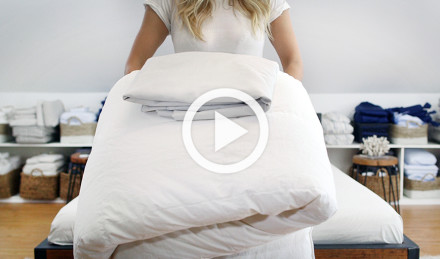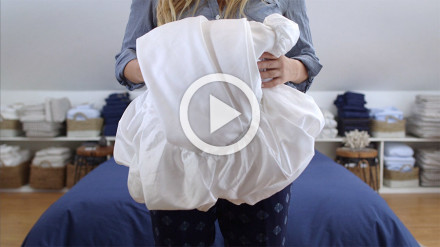Pillows were designed for better sleep, not for drowning out the sound of your partner’s snoring. Defined simply as ‘noisy breathing during sleep,’ snoring can be disruptive to the snorer and especially to his or her bed-partner. To assist in optimal nightly rest, we asked our resident sleep therapist and researcher, Dr. Angela Lachowski, Ph.D., C. Psych (Supervised Practice), for specifics on what causes snoring – and how to silence it.
What causes snoring?
During sleep, the muscles of the throat relax and narrow and the tongue falls backwards deeper into the mouth. When you inhale, vibrations are created among the loosened muscles of the mouth and throat. These vibrations produce a snoring sound that can be gentle – or in some cases, like a freight train. The narrower the airway becomes, the more the throat muscles vibrate and the louder the snore sounds. Sometimes the walls of the throat and surrounding tissue collapse in completely and block the airway, creating a potentially dangerous condition called obstructive sleep apnea. This is a serious condition with negative health consequences (read on).
There are several risk factors for snoring, including sex (males have higher risk for snoring than females), normal aging processes that contribute to looser throat muscles, anatomical abnormalities of the nose and throat (such as enlarged tonsils or nasal polyps) or conditions that lead to inflammation of the airway passage (such as a respiratory infection or seasonal allergies). Sleeping position matters for some people; most are less likely to snore when not lying on the back. Due to its muscle relaxant effects, alcohol ingested in the evening can also increase the chance of snoring. One of the biggest dangers is obesity, particularly extra fatty tissue around the neck. Even quite muscular men with large necks can have an increased probability of snoring.
What causes snoring?
During sleep, the muscles of the throat relax and narrow and the tongue falls backwards deeper into the mouth. When you inhale, vibrations are created among the loosened muscles of the mouth and throat. These vibrations produce a snoring sound that can be gentle – or in some cases, like a freight train. The narrower the airway becomes, the more the throat muscles vibrate and the louder the snore sounds. Sometimes the walls of the throat and surrounding tissue collapse in completely and block the airway, creating a potentially dangerous condition called obstructive sleep apnea. This is a serious condition with negative health consequences (read on).
There are several risk factors for snoring, including sex (males have higher risk for snoring than females), normal aging processes that contribute to looser throat muscles, anatomical abnormalities of the nose and throat (such as enlarged tonsils or nasal polyps) or conditions that lead to inflammation of the airway passage (such as a respiratory infection or seasonal allergies). Sleeping position matters for some people; most are less likely to snore when not lying on the back. Due to its muscle relaxant effects, alcohol ingested in the evening can also increase the chance of snoring. One of the biggest dangers is obesity, particularly extra fatty tissue around the neck. Even quite muscular men with large necks can have an increased probability of snoring.
When should I seek medical attention?
Not all snoring is cause for alarm, but sleep apnea has been linked to many negative health consequences. Daytime impairments in attention, memory and concentration, an increased risk for motor vehicle accidents and a greater threat of cardiovascular disease can all be attributed to this condition. If you or your partner suspect that your snoring is an issue, it’s important to get it checked out. If you are not sure if your snoring is a problem, consider these questions:
Are you excessively sleepy during the day?
Do you have morning headaches?
Are you overweight?
Do you feel tired no matter how much time you allow yourself to sleep?
Are there changes in your attention, concentration or memory
Have you or anyone else noticed breathing interruptions during your sleep?
If the answer to any of these questions is yes, it's a good idea to visit your doctor to discuss a referral for an overnight sleep study. These are not the most fun, but they are the best way for sleep specialists to assess exactly how obstructed your airway is during the night. This information is important — some people stop breathing over 100 times an hour (and don't know it!).
When should I seek medical attention?
Not all snoring is cause for alarm, but sleep apnea has been linked to many negative health consequences. Daytime impairments in attention, memory and concentration, an increased risk for motor vehicle accidents and a greater threat of cardiovascular disease can all be attributed to this condition. If you or your partner suspect that your snoring is an issue, it’s important to get it checked out. If you are not sure if your snoring is a problem, consider these questions:
Are you excessively sleepy during the day?
Do you have morning headaches?
Are you overweight?
Do you feel tired no matter how much time you allow yourself to sleep?
Are there changes in your attention, concentration or memory
Have you or anyone else noticed breathing interruptions during your sleep?
If the answer to any of these questions is yes, it's a good idea to visit your doctor to discuss a referral for an overnight sleep study. These are not the most fun, but they are the best way for sleep specialists to assess exactly how obstructed your airway is during the night. This information is important — some people stop breathing over 100 times an hour (and don't know it!).
I admit it – I snore! What can I do about it?
If you or your partner snores, don’t stress. There are solutions that will either modify or permanently resolve the issue:
Look at your lifestyle. Are you overweight? Drinking alcohol in the evening? Sniffling due to allergies? Sometimes modifying lifestyle factors is enough to resolve the problem.
For light snoring – try a white noise machine, ear plugs or a fan.
Surgery. In some cases, doctors will perform surgery on the loose tissue in the nose or throat to reduce the chance of vibration that produces loud snoring.
Oral or nasal appliances (usually constructed by a dentist).
Religiously wear your CPAP (Continuous Positive Airway Pressure machine). These are custom-fitted for sleep apnea clients and are often the only real solution for moderate-to-severe apnea cases.
Snoring can be an inconvenience, but there is no reason that it should interfere with a proper night's sleep. Sweet dreams!
I admit it – I snore! What can I do about it?
If you or your partner snores, don’t stress. There are solutions that will either modify or permanently resolve the issue:
Look at your lifestyle. Are you overweight? Drinking alcohol in the evening? Sniffling due to allergies? Sometimes modifying lifestyle factors is enough to resolve the problem.
For light snoring – try a white noise machine, ear plugs or a fan.
Surgery. In some cases, doctors will perform surgery on the loose tissue in the nose or throat to reduce the chance of vibration that produces loud snoring.
Oral or nasal appliances (usually constructed by a dentist).
Religiously wear your CPAP (Continuous Positive Airway Pressure machine). These are custom-fitted for sleep apnea clients and are often the only real solution for moderate-to-severe apnea cases.
Snoring can be an inconvenience, but there is no reason that it should interfere with a proper night's sleep. Sweet dreams!




